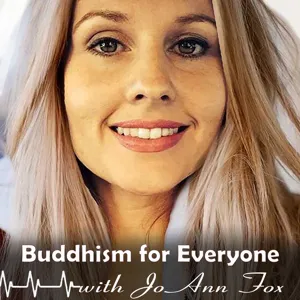Podcast Summary
Understanding Emptiness or Selflessness in Buddhism: Buddhism's concept of emptiness suggests that on a fundamental level, there's no permanent 'you'. Instead, thoughts and experiences arise and pass, much like dictators giving orders but holding no inherent power. Practicing this perspective can lead to liberation from thoughts and emotions, bringing greater peace and happiness.
According to the 10% Happier podcast, emptiness or selflessness is a concept in Buddhism that can be difficult to understand, but it doesn't mean we don't exist. Instead, it suggests that on a fundamental level, there is no permanent "you." Instead, thoughts and experiences arise and pass, much like dictators giving orders, but ultimately holding no inherent power. Practicing this perspective can lead to liberation from the grip of thoughts and the resulting emotions. During a bonus meditation, Joseph Goldstein encourages listeners to approach thoughts in a light-hearted way, recognizing their transient nature and not taking them too seriously. This perspective can help reduce the hold that thoughts have over us and bring about greater peace and happiness. If you're a Wondery Plus subscriber, you can listen to this meditation and more bonus content right now.
Observe thoughts and emotions during meditation: During meditation, instead of suppressing thoughts or emotions, observe them with curiosity and awareness to cultivate a more spacious and open mind.
During meditation, instead of trying to suppress thoughts or emotions, we should observe them with curiosity and awareness. Sit comfortably, focusing on your breath and body, and when thoughts or sounds arise, make a mental note and return to your awareness of breathing or sitting. Don't be discouraged if your mind wanders; simply acknowledge it and begin again. The goal is not to stop thinking, but to observe and investigate the nature of our thoughts and emotions. By practicing this mindfulness, we can cultivate a more spacious and open mind, allowing us to better cope with daily distractions and stressors.
Exploring the Basics of Meditation with Joseph Goldstein on 10% Happier: Start your meditation journey with Joseph Goldstein's 7-day Basics course on the 10% Happier app, debunking myths and introducing fundamental concepts.
There are numerous meditations available from Joseph on the 10% Happier app, including a flagship course called "The Basics," which is an excellent way to begin practicing meditation. Joseph and the host discuss the fundamental concepts of meditation and debunk common myths. This seven-day program is an effective way to get started. In the coming weeks, the podcast will delve deeper into themes of grit and resilience. Additionally, Wondery offers a new family-friendly podcast called "The Cat in the Hatcast," featuring Dr. Seuss characters and the Cat in the Hat himself. The podcast is filled with fun songs, tongue twisters, and witty wordplay, providing an enjoyable listening experience for the whole family. Listeners can access these podcasts early and ad-free by subscribing to Wondery Plus or using Amazon Music with a Prime membership. Don't forget to share your feedback by completing a survey at Wondery.com/survey. Happy listening!
Exploring the Controversial Reality TV Show 'The Swan': The Swan, a reality TV show from the early 2000s, showcased women undergoing physical transformations and competing in a beauty pageant after months of isolation and criticism, leading to ethical concerns and a cringeworthy viewing experience. Producers should consider the potential consequences of their ideas before bringing them to the public.
The early 2000s saw a surge in controversial reality TV shows, with The Swan being a prime example. Hosted by Misha Brown on The Big Flop podcast, this episode explored the ill-fated series where women underwent physical transformations and competed in a beauty pageant after months of isolation and criticism. The result was a viewing experience that left audiences cringing rather than entertained. This experiment in reality TV, with its isolating and demeaning nature, highlights the importance of ethical considerations in entertainment production. It serves as a reminder that not all big ideas are good ideas, and that the potential consequences should always be carefully weighed before bringing them to the public. Listen to The Big Flop on Wondery or wherever you get your podcasts for more insight into the biggest pop culture fails of all time.



